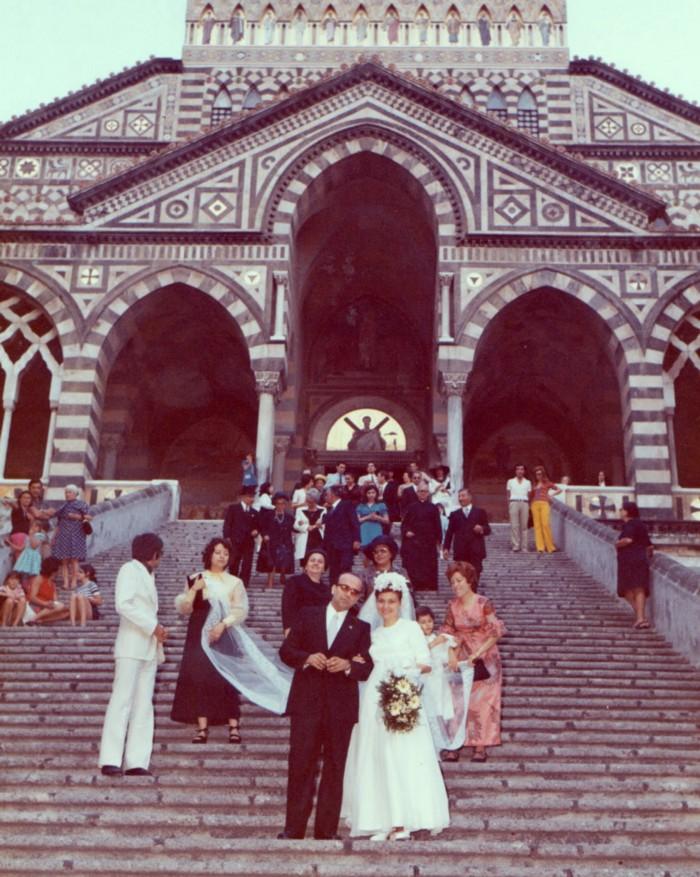Half century. Fifty years of marriage
Curated from: angallo.medium.com
Ideas, facts & insights covering these topics:
18 ideas
·1.11K reads
7
2
Explore the World's Best Ideas
Join today and uncover 100+ curated journeys from 50+ topics. Unlock access to our mobile app with extensive features.
Memories
What are the memories of men? How many can they be? Where are they? Who can tell them? What can they tell? Why is it worth talking about? How can they be found out? Should they be preserved? Where are they hiding? Memories are also called remembrance, they can be stored not only on the paper page, with images and symbols, but also in bits & bytes, on the digital page, which then becomes dynamic. MEDIUM is the ideal place.
11
171 reads
Amelia and I
Amelia and I will remember in days the memory of our wedding on August 3, 1972. It was a Thursday. Our first fifty years of marriage, celebrated in the Cathedral of Amalfi by Father Alfonso Arpino, my mother’s brother, together with Mons. Riccardo Arpino, concelebrant for the occasion.
To make 50 years, half a century, it takes 600 months, 2608.93 weeks, 18.262.5 days, 26.298.000 minutes. This is the space we call time, provided we know what this space is made of.
10
139 reads
A Mystery Word
The word “time” is undoubtedly one of the most used and mysterious words in all languages. Yet its use does not explain its meaning. The word is referred to in countless contexts.
The many possible synonyms make me lose myself in a forest of meanings that take me far away, but I will never be able to return to the decisive station, the one of departure: that Thursday fifty years ago at 18.00.
The only thing I remember well is that there was a storm in the morning. Then came the clear.
10
126 reads
Time Exists
Saint Augustine wrote in his “Confessions”: “What is time? If no one asks me, I know. If I want to explain it to anyone who asks me, I don’t know anymore." Enlightening statement.
Time exists. How else would we fix our watches? Time organizes our universe both mentally and physically. Do you think it would be our world if things were always the same and there was no time to change them.
The question we must rather ask ourselves is whether time is really necessary. Perhaps the questions I ask myself are too difficult and someone will say, with an easy joke, that I am wasting time. Maybe.
10
86 reads
The Past & The Future
If I think about that day, I relive something and see someone still in the present, but I know well that absence dominates. All I have left is the image of a place that is still present, I miss that time that appears to be lost and I delude myself to find it again, remembering.
The past and the future are real. Not everyone agrees on this point. Intuitively we can say that “now”, this particular moment, is real, while the past has somehow been “fixed”, plastered, and exists only in books, documents, papers, photos, voices recorded in vanished faces. and disappeared.
11
78 reads
A "Continuum"
The future in this image at the exit of the Church, after the ceremony, does not yet exist because it has not yet taken place. But physics teaches us that every moment, in the form of an event in both the past and the future, implies a present moment. A difficult fact to admit in our everyday life, but it is so.
Although we may not be aware of what is happening around us at all times, we live in a reality of four dimensions: length, height, depth, in a “continuum” which is time. This wedding photo is both past and future in their reality. Our reality that we are celebrating.
10
59 reads
Newton & Einstein
Each of us perceives the sense of time in a different way. This is true in both a biological and a physical sense. For Newton, time was universal and common to all. Then Einstein came and explained that instead time for a person is closely related to his moving in space and to the force of gravity.
From a psychological and biological point of view, the time measured by atomic clocks is not as important as that measured by our internal rhythms and the amount of memory that accumulates in each of us.
Everything happens differently, it depends on who we are, on what happens to us.
11
52 reads
As We Get Older ...
As we get older we find that time passes much faster than before. And the writer knows it well. If I ask Amelia, what she remembers of that day, I discover that her memories are not mine, her time is different from mine, as is her past in this shared present that yesterday was the future.
We live in the past. Each of our actions before it is received by our brain takes an amount of time to be registered and recognized. To be precise 80 milliseconds. If I touch the tip of my nose or that of my foot, it will take longer to feel the action in my brain.
12
48 reads
We Live In The Past
Our conscious experience takes longer to assemble the sequence of actions. The perception of the moment, of now, can therefore be said to have already passed.
Therefore, we live in the past. The distance between the things that happen and their perception is about 80 milliseconds. Science says it with its instruments, but our brains, Amelia’s and Antonio’s, relive the distance of this time-space in a completely different way.
A surreal coexistence has made the past become the future and we continue to relive it in the present always in a different way.
11
41 reads
Our Memory
Our memory is not always reliable. When we remember an event that happened in the past, our brain uses a technique very similar to imagining the future. The process is not like playing a video, but rather like staging a text.
If the text is wrong for any reason, you may have a distorted memory similar to the real one. For this reason, visual evidence is very questionable and subjective and not always convergent in a court of law. You will never find two people who see a thing in the same way.
11
41 reads
Does Memory Deceive Us?
Whenever Amelia tells the events of her journey to get to the Cathedral of Amalfi on time she adds something not said, not remembered, not felt then, but recognized or found today. Is such a thing possible?
But, then, does memory deceive us, deceive us or even recreate what never happened?
Consciousness depends on knowing how to manipulate time. Many cognitive abilities are important for consciousness and are not yet well known to us.
It is clear, however, that the ability to manipulate time and its possibilities is a crucial aspect of the problem.
11
40 reads
A Metaphysical Testimony
Land animals, unlike those of water, manage to possess a very broad visual trend in order to have enough time to choose from a range of actions and decide for the best.
Consciousness would not be possible without the ability to imagine another time. But how many humans know they have a conscience?
Did Amelia and I know that we would have to find the way and the way to build a new time for us, in a space as new and mysterious as it is unexplored and dangerous? The space of these fifty years is an almost metaphysical testimony.
11
37 reads
Back To The Big Bang
The clutter increases as time passes. The difference between the past and the future, memory, aging, randomness and free will, rests on the fact that the universe is constantly evolving from order to disorder.
Entropy is constantly increasing in the opinion of physicists. There are many ways of being disordered, the condition of which provides for a high entropy, compared to the order which has a low entropy.
The increase in the latter, therefore, is completely natural. But to understand the low entropy of past times, we need to go back to the Big Bang.
10
32 reads
Complexity
Scientists have not yet been able to give an answer to why entropy was low at that time and how this increase affects memory and its randomness.
Fifty years later, after our Big Bang, I would not be able to assess whether the entropy of our coexistence has been elevated or reduced, whether we have proceeded from order to disorder or vice versa.
Complexity comes and goes. Unlike those who consider themselves creationists, most people have no problem evaluating the difference between “order” and “disorder”, that is, between low and high entropy.
11
29 reads
An Experience
This entropy increases but the complexity is ephemeral, volatile, increases and decreases intricately, not without surprise. The work done by complex structures is to increase entropy as in the case of the origin of life.
But we are far from understanding this truly unique phenomenon. I can say one thing certain in any case, and that is this half century of life lived in common has shown that experiencing complexity is the great challenge of those who decide to choose marriage and live in a condition of “order” imposed by a law, not only of nature, but also of law.
10
33 reads
The Arrow Of Time
Aging can be reversed. We all age and this is part of the race towards ever-increasing disorder. But it is only the universe as the whole that must increase in entropy, not just each of its components.
If we reverse the arrow of time in a living organism, we make a technological challenge but not a physical impossibility. We are making progress on new fronts such as stem cells, yeast and even mice and human muscle tissue.
Someone thinks of eternal life, which is not imminent, but sooner or later something will happen. Many dare to believe and hope for it. But to do what? I then ask myself.
10
27 reads
Life Pushes The New
Personally, I would like to have the opportunity to start all over again. I don’t know what Amelia would do if she could reverse the arrow of time and go back to that day fifty years ago.
To tell the truth, I can’t say either. A return to the past? Perhaps the future is better than daring the arrow.
The average time of a life is made up of one billion heartbeats. Both simple and complex organisms die. It is sad to say but it is a necessary part of the picture of the human condition: life pushes the new, eliminating the old.
11
32 reads
A Spiritual Metabolism
There is a simple scale of values in this sense and it concerns the body’s metabolism.
To make fifty years of married life it takes two billion beats to challenge time and space together towards the spiritual metabolism.
11
46 reads
IDEAS CURATED BY
Antonio Gallo's ideas are part of this journey:
Learn more about scienceandnature with this collection
Effective note-taking techniques
Test-taking strategies
How to create a study schedule
Related collections
Similar ideas
2 ideas
past, a curse or blessing?
phanestories.wordpress.com
3 ideas
Why We Forget Most of the Books We Read
theatlantic.com
3 ideas
Read & Learn
20x Faster
without
deepstash
with
deepstash
with
deepstash
Personalized microlearning
—
100+ Learning Journeys
—
Access to 200,000+ ideas
—
Access to the mobile app
—
Unlimited idea saving
—
—
Unlimited history
—
—
Unlimited listening to ideas
—
—
Downloading & offline access
—
—
Supercharge your mind with one idea per day
Enter your email and spend 1 minute every day to learn something new.
I agree to receive email updates

